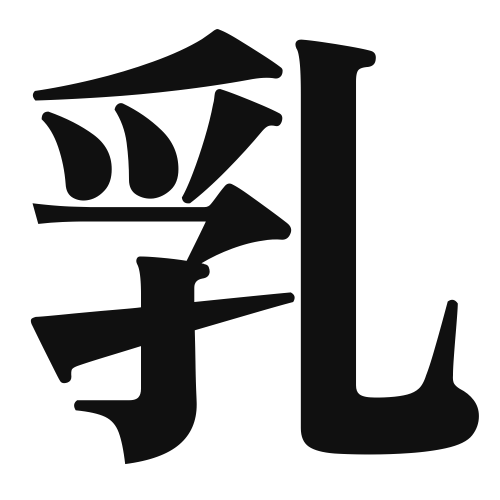1. Overview of Meaning
The kanji “乳” (pronounced “nyuu”) means “milk” or “nipple.” It refers to the liquid produced by mammals to feed their young, as well as the anatomical structures associated with it.
2. Formation and Radical
Formation of the Kanji: The kanji “乳” is a pictogram that originally depicted a breast. It is classified as a phonetic compound because it combines elements that suggest both meaning and sound.
Radical: The radical for “乳” is “牛” (ushi), which means “cow.” This is fitting, as cows are a primary source of milk in many cultures.
3. Examples of Usage
Common Words and Phrases:
- 乳製品 (nyuu seihin) – dairy products
- 母乳 (bonyuu) – breast milk
Example Sentences in Daily Conversation:
- 赤ちゃんは母乳を飲んでいます。 (Akachan wa bonyuu o nondeimasu.) – The baby is drinking breast milk.
- 私は乳製品が好きです。 (Watashi wa nyuu seihin ga suki desu.) – I like dairy products.
4. Synonyms and Antonyms
Similar Kanji:
- 牛乳 (gyuunyuu) – cow’s milk, which specifically refers to milk from cows.
- 乳酸 (nyuusaan) – lactic acid, which is related to milk fermentation.
Antonyms:
- 水 (mizu) – water, which is a different liquid and does not have the nutritional properties of milk.
5. Cultural and Historical Background
Relation to Japanese Culture: In Japan, milk and dairy products have become increasingly popular, especially in modern cuisine. Traditional Japanese diets were primarily plant-based, but dairy has found its place in contemporary meals.
Proverbs and Idioms: One common saying is “乳を飲む子は育つ” (nyuu o nomu ko wa sodatsu), which translates to “A child who drinks milk grows up.” This emphasizes the importance of nutrition in child development.
